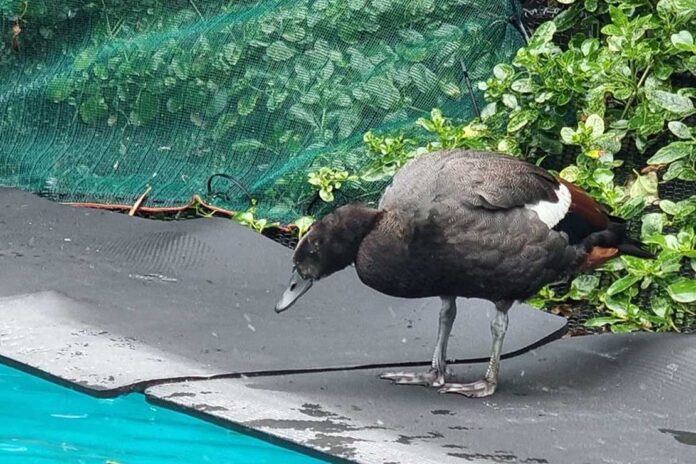Source: Massey University
The male pūtangitangi during his time at the Central Energy Trust Wildbase Recovery Centre.
A young pūtangitangi, or New Zealand Paradise Shelduck, who had a traumatic start to life is now ready to take on the world after a somewhat unconventional rehabilitation process.
In late 2021, the male pūtangitangi was admitted to Wildbase Hospital at Massey University after falling victim to a dog attack on a property in Whanganui. After 14 days of treatment and observation, he was transferred to the Central Energy Trust Wildbase Recovery Centre in Palmerston North to begin the rehabilitation process.
Wildlife Rehabilitation Technician Carina Svensson says transitioning to the new environment proved daunting for the young male. “It was a lot for the little duck to have to go through, so he preferred to hide away in a corner for most of the day, and would only emerge for an hour or two in the morning when no one was around for a quick feed before quickly seeking out safety again.”
After a brainstorming session led to the idea of a companion duck, Ms Svensson set out to find a suitable option in the local area. A visit to the local Hunting & Fishing store paid off, where she was offered a bright blue plastic decoy duck. MoreFM had used the decoy in a competition earlier in the year, and the staff at Hunting & Fishing kindly donated the decoy duck to help provide support and comfort to the nervous patient.
The decoy duck getting a paint job to resemble a female pūtangitangi.
With a paint job to transform it into a female pūtangitangi, the decoy was introduced into the aviary, and it wasn’t long before she was being investigated by the young male. Ms Svensson says he began spending more time out in the aviary swimming and hanging out with his new friend. “After nearly a month in our care he’s now grown into a beautiful, confident young male. Hopefully he’ll return to freedom with a fond memory of his friend and a vivid image of what to look out for in his future quest for a female companion.”
The decoy and the male pūtangitangi hanging out at the Central Energy Trust Wildbase Recovery Centre.
The pūtangitangi was transported to Bird Rescue in Whanganui this morning, where he will be housed with three others who are also about to be released. He will spend a few days with them, giving him the opportunity to live alongside and interact with others of the same species. They will all be released together next week.
Ms Svensson says it’s the best possible outcome for this patient. “This gives him the opportunity to socialise with other pūtangitangi and be released with the group rather than on his own as a naïve and young bird who, due to his ordeal with the dog, never got the opportunity to get to know his own kind.”
She adds that dog attacks on birds often result in fatal or severely debilitating injuries. “It’s a timely reminder to all dog owners to keep dogs on a leash, particularly in areas where birds are feeding, nesting, raising young or moulting. By doing so we can help protect our precious fauna.”
The pūtangitangi is New Zealand’s only species of shelduck. It is endemic to New Zealand and is protected under the Wildlife Act.
The recovery team wish to extend a special thanks to the team at Manawatū Hunting & Fishing for kindly donating the decoy duck.
Related articles
Kiwi saved during hatching at Wildbase
Wildbase takes shag and penguin home
Long stay at Wildbase almost over for penguin
Created: 28/01/2022 | Last updated: 28/01/2022



